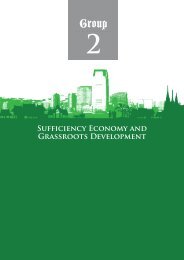Conflict, Legitimacy and Government Reform: Equitable Allocation of ...
Conflict, Legitimacy and Government Reform: Equitable Allocation of ...
Conflict, Legitimacy and Government Reform: Equitable Allocation of ...
You also want an ePaper? Increase the reach of your titles
YUMPU automatically turns print PDFs into web optimized ePapers that Google loves.
Panel Discussion<br />
nor French, the most widely used languages in the region, distinguish<br />
between “politics” (the tactics <strong>and</strong> strategy <strong>of</strong> amassing <strong>and</strong> using<br />
power) <strong>and</strong> “public policy” (debating, creating, <strong>and</strong> implementing<br />
decisions that affect the public) <strong>and</strong> <strong>of</strong>ten require use <strong>of</strong> an English<br />
phrase or an extended definition to explain the concept. The region also<br />
does not have a tradition <strong>of</strong> drawing clear distinctions between the<br />
public <strong>and</strong> private spheres <strong>of</strong> life, another factor making explanation <strong>of</strong><br />
public policy issues difficult. Project Citizen has, however, been able to<br />
overcome these obstacles <strong>and</strong> is used in more than 14 countries<br />
throughout the region.<br />
Middle East <strong>and</strong> North Africa. Civic education in the MENA<br />
region has its origin in a Civic Education conference held at the Dead<br />
Sea, Jordan in 2003 where civic educators from a number <strong>of</strong> Arab<br />
countries pledged their support for a regional network to promote civic<br />
awareness <strong>of</strong> Arab persons <strong>and</strong> their aspirations in such a way that they<br />
will become active citizens who are aware <strong>of</strong> their rights <strong>and</strong><br />
responsibilities <strong>and</strong> those <strong>of</strong> others.<br />
From an initial three countries, Egypt, Jordan, <strong>and</strong> occupied<br />
territories <strong>of</strong> the West Bank <strong>and</strong> Gaza, civic education in the Arab world<br />
has grown to include Morocco, Lebanon, Yemen, Tunisia, Algeria,<br />
Bahrain, Egypt, Saudi Arabia, Qatar, Oman, Kuwait, <strong>and</strong> the UAE.<br />
There are in general terms three levels <strong>of</strong> progress among the Arab<br />
countries. Jordan <strong>and</strong> Morocco have extensive national programs <strong>and</strong><br />
broad support from educational authorities at the regional <strong>and</strong> national<br />
level. Lebanon, Egypt, Yemen, Tunisia, <strong>and</strong> Algeria had had successful<br />
pilots <strong>of</strong> either Project Citizen <strong>and</strong>/or Foundations <strong>of</strong> Democracy <strong>and</strong> are<br />
working to develop national implementation <strong>of</strong> their activities. The<br />
remaining countries have introduced successfully Project Citizen or<br />
Foundations materials into selected schools.<br />
As in other parts <strong>of</strong> the world, the Center’s MENA programs attract<br />
a talented group <strong>of</strong> reformers from backgrounds in journalism <strong>and</strong> civil<br />
society as well as the education field. They share common goals <strong>of</strong><br />
wishing to improve the democratic participation <strong>of</strong> young people in<br />
85














